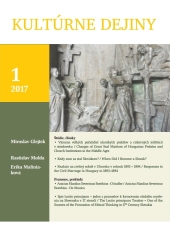Reakcie na civilný sobáš v Uhorsku v rokoch 1893 – 1894
Responses to the Civil Marriage in Hungary in 1893–1894
Author(s): Erika MaliniakováSubject(s): History
Published by: VERBUM - vydavateľstvo Katolíckej univerzity v Ružomberku
Keywords: public meetings; civil marriage; Catholic Church; liberal government; secularism
Summary/Abstract: Passing the liberal law on the compulsory civil marriage by the Dietof Hungary in 1894 gave rise to a heated debate. The law was one of the so-called church-political laws that were set by the government of Sándor Wekerle as its priorities. In that time it was a controversial law. It changed the previous marriage forms and had an impact on the integrity of the Catholic sacramental marriage. The frst mentions of the marriage reform and the introduction of civil marriage date back to 1868. Political climate, however, matured enough for the marriage reform as late as in 1890. In terms of the marriage reform, the most dynamic year was 1894 when crucial parliamentary deliberations and key civil public meetings took place in Budapest.In the streets of several cities the Hungarian public expressed their attitude to the debated church-political laws in an effort to influence the ongoing deliberations. At some, especially county meetings the issue of the church-political reforms became an associated topic. Along with a clear attitude against the reforms the organizers appealed to the national consciousness of participants. Therefore, the public meetings not exclusively dealing with the church-political laws in Hungary were prohibited. The liberal meetings were held in the spirit of Hungarian national unity. The following paper provides an insight into the Hungarian society coming to terms with the marriage reform in the public space.The church-political situation of the 1890s in Hungary makes complete the context of changes of religious behaviour on the European continent in the “long” 19th century. In order to fully understand the reform moods and intentions, it is necessary to note partial reforms in the state. Therefore, in order to understand the church-political situation in Hungary, it is important to know each of the church-political laws. In this paper we focus on the responses of the Hungarian society to the Act XXXI/1894 on civil marriage. The aforesaid act was controversial in that time because it cancelled the long-established marriage forms and the validity of the Catholic sacramental marriage. A wave of opposition against the compulsory form of civil marriage emerged, especially on the part of the Catholic Church.The debate on the marriage reform culminated in 1893–1894. It involved all social classes because the changes affected every Hungarian citizen. The present paper analyzes the moods and results of public meetings against the church-political laws and the civil marriage. The reform of marriage was viewed positively by the liberal club and negatively by the Catholic Church. Opinion differences between both sides are represented by the described public meetings in Hungary. The analysis has generated interesting facts. First of all, it has pointed to the civil interest in expressing one‘s opinion pro or con the marriage reform. It has shown a huge political mobilization of conservative Catholic circles and the institutionalization of political Catholicism in Hungary (Catholic People‘s Party). The complex church-political situation between the State and the Church generated new personalities (also from the ranks of laity), whose erudition and potential was clear not only from their lectures at the Catholic congresses but also from their literary activities. Although the pressure of the Catholic public was high, the law was eventually passed by the Diet of Hungary and sanctioned by the monarch in 1894. In October 1895 it came into force and with minor amendments would remain effective up to 1949.
Journal: Kultúrne dejiny
- Issue Year: 8/2017
- Issue No: 1
- Page Range: 57-71
- Page Count: 15
- Language: Slovak

